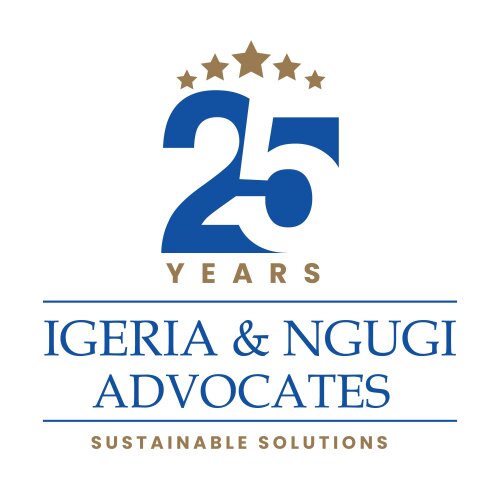Best Venture Capital Lawyers in Nairobi
Share your needs with us, get contacted by law firms.
Free. Takes 2 min.
List of the best lawyers in Nairobi, Kenya
Legal guides written by Adroit Law LLP:
- Kenya Launches Digital Nomad Visa: A Gateway for Remote Workers
- Navigating the Payment System License Maze in Kenya
- Navigating the Complexities of Mining Licenses and Permits in Kenya: A Look into Artisanal and Large-Scale Operations
About Venture Capital Law in Nairobi, Kenya
Nairobi has emerged as a significant hub for venture capital (VC) activity within Africa, driven by a growing entrepreneurial ecosystem and a surge in technology-driven startups. The city's venture capital landscape benefits from a youthful population, an expanding middle class, and increased internet penetration which fosters innovation. Laws governing venture capital in Nairobi aim to facilitate investment while protecting both investors and entrepreneurs, ensuring a balanced environment conducive to economic growth.
Why You May Need a Lawyer
Engaging in venture capital transactions involves complex legal agreements and regulatory frameworks. You might need a lawyer if you are:
- Establishing a startup and seeking capital investment to expand operations.
- An investor aiming to fund a promising business or project, requiring due diligence and legal protection.
- A startup ready to negotiate term sheets and investment agreements with potential investors.
- Facing legal disputes concerning ownership stakes, intellectual property, or compliance with local laws.
- Wanting to ensure compliance with regulatory requirements to avoid future legal issues.
Local Laws Overview
Venture capital in Nairobi is influenced by several legal frameworks:
- Companies Act 2015: Outlines the process of company formation, shares allotment, and governance structures applicable to startups and investors.
- Capital Markets Authority (CMA) Regulations: Provides guidelines for investors and companies in undertaking proper financial transactions.
- Investment Promotion Act: Aims to encourage and facilitate investment through various incentives while ensuring legal compliance.
- Competition Act: Ensures fair practices and prevents anti-competitive behavior in the market.
Understanding these laws can help startups and investors navigate the VC landscape effectively.
Frequently Asked Questions
What is Venture Capital and how does it work?
Venture Capital is a form of private equity financing provided by investors to startups and small businesses with long-term growth potential. In exchange, investors typically receive equity or ownership stake in the company.
Can a foreign investor invest in a Nairobi-based startup?
Yes, foreign investors can invest in Kenyan startups. However, there may be regulatory requirements, including compliance with the Investment Promotion Act and foreign exchange regulations.
What is a term sheet?
A term sheet is a non-binding document outlining the basic terms and conditions under which an investment will be made. It serves as a template for the formal investment agreement.
What legal documents are crucial in VC transactions?
Key documents include the term sheet, shareholders’ agreement, subscription agreement, and any related intellectual property agreements. Legal advice can help draft and review these documents.
What are the tax implications of VC investments in Nairobi?
VC investments may be subject to capital gains tax, stamp duty, and other relevant taxes. Consulting with a tax advisor or lawyer can provide clarity on specific implications.
What protections do investors have in Kenya?
Investors are protected through the legal system, including adherence to contract law, regulatory oversight by the CMA, and established mechanisms to resolve disputes.
Do startups require permits to receive foreign VC funding?
While startups don't need special permits to receive foreign funding, they must comply with the Exchange Control Act ensuring all foreign currency dealings are within legal frameworks.
How do intellectual property laws apply to startups in Kenya?
Startups should register their intellectual property including trademarks, patents, and copyrights, to protect their innovations. Proper legal guidance is important to navigate these requirements.
What happens if a startup fails after receiving VC funding?
If a startup fails, the loss is usually borne by the investors as part of their high-risk, high-reward strategy. Provisions can be negotiated in initial agreements to mitigate risks.
How long does the VC funding process typically take in Nairobi?
The VC funding process can last anywhere from a few months to over a year, depending on the readiness of the startup, the complexity of the deal, and the level of due diligence required.
Additional Resources
Consider exploring these resources for more information or assistance:
- Capital Markets Authority (CMA): Provides regulatory guidelines for investments.
- Kenya Investment Authority (KenInvest): Offers support and advisory services for investors.
- Nairobi Securities Exchange (NSE): Valuable for understanding market dynamics.
- Law Society of Kenya (LSK): Can help find qualified legal professionals experienced in venture capital law.
Next Steps
If you require legal assistance in venture capital related issues:
- Consult a Lawyer: Reach out to a lawyer specializing in corporate or venture capital law for personalized legal advice.
- Conduct Due Diligence: Before entering into agreements, ensure thorough due diligence on all parties involved.
- Research Regulatory Requirements: Stay informed of all legal and regulatory requirements applicable to your situation.
- Network with Industry Professionals: Engage with local venture capital networks or entrepreneurship groups to gain insights and connections.
Being well-prepared and informed will help navigate the complexities of venture capital arrangements effectively and securely.
Lawzana helps you find the best lawyers and law firms in Nairobi through a curated and pre-screened list of qualified legal professionals. Our platform offers rankings and detailed profiles of attorneys and law firms, allowing you to compare based on practice areas, including Venture Capital, experience, and client feedback.
Each profile includes a description of the firm's areas of practice, client reviews, team members and partners, year of establishment, spoken languages, office locations, contact information, social media presence, and any published articles or resources. Most firms on our platform speak English and are experienced in both local and international legal matters.
Get a quote from top-rated law firms in Nairobi, Kenya — quickly, securely, and without unnecessary hassle.
Disclaimer:
The information provided on this page is for general informational purposes only and does not constitute legal advice. While we strive to ensure the accuracy and relevance of the content, legal information may change over time, and interpretations of the law can vary. You should always consult with a qualified legal professional for advice specific to your situation.
We disclaim all liability for actions taken or not taken based on the content of this page. If you believe any information is incorrect or outdated, please contact us, and we will review and update it where appropriate.

















